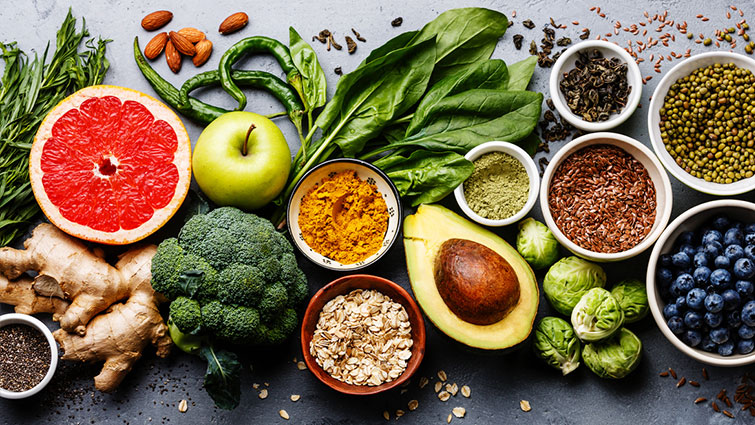
We all know eating nutritious foods helps us feel better and be healthier. What you might not know is diet may be related to up to 50% of cancers.
The good news is that certain foods can actually help prevent and fight cancer. This guide helps you add each season's most nutritious anti-cancer foods to your diet.
Subscribe: Get nutritious, delicious recipes in our monthly newsletter, A Healthy Tomorrow.
Which foods fight and prevent cancer?
When it comes to cancer-fighting foods, you can't beat the power of produce and plant-based foods. Certain fruits, vegetables, nuts, beans, oats, whole grains, spices and teas provide unique benefits not found in other foods. These benefits help reduce the risks of certain cancers and can even slow tumor growth and recurrence. Most of these plant-based foods provide plenty of other health benefits too.
While it's better to eat these foods whenever you can (versus not at all), you can go a step further. The best way to eat produce is when it's in season. In-season produce:
- Tastes better.
- Is more nutritious due to good growing conditions.
- Is often cheapest due to its abundance and more local production.
- Is better for the environment, as it promotes more sustainable farming.
Remembering which cancer-fighting foods are in-season isn't easy. This visual guide can help you plan a cancer-fighting diet that includes more of these foods year round.
How do plant-based foods fight cancer?
Produce and plant-based foods help you fight cancer in a number of ways. The best way to benefit from their cancer-fighting compounds is to eat whole foods, not supplements. While some foods are better cooked and some are better organic, what's most important is eating healthier overall.
Tip: Foods linked in the tables below (like tomatoes) help you discover healthy new recipes.
Carotenoids
Carotenoids like beta-carotene (carrots), lycopene (tomatoes) and lutein (spinach) provide you with antioxidants. Antioxidants help protect your cells from damage that might turn them into cancer cells.
| Apricots | Tomatoes | Mangos** | Plums | Nectarines* | Papaya** | Bell peppers | Acorn squash | Pumpkin* | Beets | Carrots | |
 |
 |
 |
 |
 |
 |
 |
 |
 |
 |
 |
|
| Spring | |||||||||||
| Summer | |||||||||||
| Fall | |||||||||||
| Winter |
(*) indicates foods that are better to buy organic, due to higher average pesticide residue.
(**) indicates foods that are less important to buy organic due to lower average pesticide residue.
- Cooked tomatoes are higher in lycopene. According to the AICR, a diet high in lycopene could prevent 11% of prostate cancer cases.
Greens
Leafy greens are a rich source of folate, which helps with DNA formation and, in some cases, DNA repair. Abnormalities in your DNA can turn normal cells into cancer cells.
| Spinach | Kale | Arugula | |
 |
 |
 |
|
| Spring | |||
| Summer | |||
| Fall | |||
| Winter |
Cruciferous Vegetables
Cruciferous vegetables (those with cross-shaped flowers) have multiple cancer-fighting benefits.
First, they contain sulforaphane, which can turn off certain carcinogens. Sulforaphane may also turn on the natural process of cell destruction, which can be key to preventing cancer.
Second, they contain indoles, which are effective at preventing and slowing hormone-receptive cancers, like breast cancer.
| Broccoli | Cauliflower** | Bok choy | Broccoli sprouts | Turnips | Brussels sprouts | Cabbage** | Arugula | Kale | |
 |
 |
 |
 |
 |
 |
 |
 |
 |
|
| Spring | |||||||||
| Summer | |||||||||
| Fall | |||||||||
| Winter |
Beans, Legumes and Soy
Like cruciferous vegetables, beans help prevent and fight cancer in multiple ways. Beans contain cancer-fighting substances, like
- Protease inhibitors, which may slow tumor growth.
- Phytates, which may help prevent or slow certain cancers.
- Manganese, which helps form an enzyme that protects cells from damage.
- Kaempferol and quercetin, which have antioxidant and anti-inflammatory properties.
Beans are best eaten cooked to prevent proteins called lectins from irritating your stomach. Canned beans are slightly less nutritious but still good for you (though you'll want to avoid cans with BPA).
Soy is best eaten organic to avoid GM plants. What you may have heard about soy's danger with hormone-sensitive cancers is untrue. Numerous studies after 2009, including from the American Cancer Society, show soy to be safe with these cancers.
| Black beans | Chickpeas | Kidney beans | Lentils | Pinto beans | Soy | |
 |
 |
 |
 |
 |
 |
|
| Spring | ||||||
| Summer | ||||||
| Fall | ||||||
| Winter |
Oats, Whole Grains and More
Oats and whole grains are low glycemic index carbohydrates, which can be very healthy in appropriate portions. Low glycemic index foods avoid spikes in blood sugar that can lead your body to store more fat. Oats contain:
- Manganese and B-vitamins.
- Selenium, which is a mineral that helps the immune system fight cancer.
- Beta-glucan, which bolsters the immune system.
- Plant lignans, which help protect against hormone-sensitive cancers.
| Barley | Brown rice | Bulgur | Oats & oatmeal | Quinoa | Corn | Potatoes* | Sweet potatoes** | |
 |
 |
 |
 |
 |
 |
 |
 |
|
| Spring | ||||||||
| Summer | ||||||||
| Fall | ||||||||
| Winter |
Seasonings
The way you season your food can have surprising benefits for fighting cancer. Certain seasonings, either fresh or dried, can reduce inflammation and provide antioxidants, both key parts of cancer prevention.
- Turmeric seasoning has seven separate mechanisms that fight cancer. Use it with black pepper to increase its availability to be absorbed by your body by 1000%.
- When you crush or chop garlic, let it sit for 10 minutes before cooking to increase its benefits.
Healthy Oils
Certain oils are much healthier than others and can have cancer-fighting properties. Eat these foods and use these oils to cook your foods.
| Avocado** | Almonds | Walnuts | Olive oil | Canola oil | Flax oil | Grapeseed oil | |
 |
 |
 |
 |
 |
 |
 |
|
| Spring | |||||||
| Summer | |||||||
| Fall | |||||||
| Winter |
- Many nuts are excellent sources of protein and healthy fats that actually lower your cholesterol.
- Recent studies suggest walnuts may reduce the risk and recurrence of breast cancer.
- Use olive oil for low-temperature cooking and salad dressings.
Foods with Other Cancer-Fighting Properties
| Asparagus** | Mushrooms | Berries | Watermelon | Melons | Apples* | Citrus fruits | Green tea | |
 |
 |
 |
 |
 |
 |
 |
 |
|
| Spring | ||||||||
| Summer | ||||||||
| Fall | ||||||||
| Winter |
- Berries contain anthocyanins that can help fight cancer cell proliferation.
- Watermelon is another good source of lycopene alongside tomatoes.
- Green and white teas contain EGCG that can help prevent tumors from recruiting blood vessels to help them grow.
Published: July 2019. This article is published by Loma Linda University Health to provide general health information. It is not intended to provide personal medical advice, which should be obtained directly from a physician.












